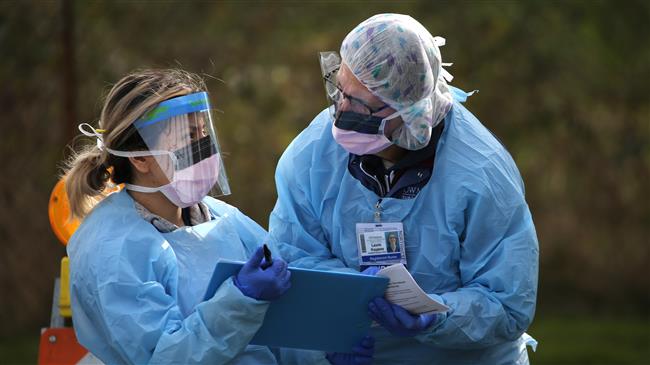COVID-19 Infections: US tops world in cases and logs record unemployment
The United States now has more COVID-19 infections than any other country, and a record number of newly unemployed people, as the coronavirus crisis deepens around the world.
Healthcare systems in even the most developed nations are being stretched to breaking point with grim warnings they could soon be overwhelmed — and a prediction that 1.8 million could die from the disease this year.
China, which appeared to have broken the back of its outbreak, will bar foreigners from Friday as it frets over a surge in imported cases, illustrating the difficulty of containing a virus in an interconnected world.
The move comes as Wuhan, the city where the new coronavirus first emerged late last year, readied to ease severe movement restrictions in place for two months.
That lockdown has now been aped around the world, with three billion people told to stay indoors.
More than 530,000 people globally have been sickened by the disease, one sixth of them in the US, which on Thursday edged out Italy as the worst-affected nation.
“We are waging war on this virus using every financial, scientific, medical, pharmaceutical and military resource, to halt its spread and protect our citizens,” US President Donald Trump said.
With about 40 percent of Americans under lockdown, Trump urged citizens to do their part by practising social distancing: “Stay home. Just relax, stay home.”
– Grim predictions –
Even with the kind of strict measures being implemented, researchers at Imperial College London said Thursday the global death toll could be staggering.
Their model shows 1.86 million people could die, with nearly 470 million infected this year.
Failure to act swiftly in imposing lockdowns and strict social distancing could make those numbers far higher, they warned.
“Our analysis highlights the challenging decisions faced by all governments in the coming weeks and months, but demonstrates the extent to which rapid, decisive and collective action now could save millions of lives,” the researchers said.
As fears mount over a global recession that could even dwarf the Great Depression of the 1930s, leaders from the Group of 20 major economies held crisis talks by video link on Thursday.
They pledged a “united front” to fight the outbreak — along with an enormous financial rescue package.
“The virus respects no borders,” the leaders said in a statement.
“We are injecting over $5 trillion into the global economy, as part of targeted fiscal policy, economic measures, and guarantee schemes to counteract the social, economic and financial impacts of the pandemic.”
They also pledged “robust” support for developing nations, where experts fear the coronavirus could wreak havoc.
– Painful choices –
With hospitals under severe strain, medical workers in Italy and Spain are making painful choices.
“If I’ve got five patients and only one bed, I have to choose who gets it,” Sara Chinchilla, a pediatrician at a hospital near Madrid, told AFP.
“People are dying who could be saved but there’s no space in intensive care.”
In Britain, the National Health Service said London’s hospitals were facing a “continuous tsunami” of seriously ill COVID-19 patients, despite a lockdown imposed this week.
And in New York, where tens of thousands are ill, Governor Andrew Cuomo warned there were simply not enough hospital beds.
“Almost any scenario that is realistic will overwhelm the capacity of the current healthcare system,” he said.
– Economic devastation –
The pandemic has already become catastrophic for the global economy.
In the United States, the world’s largest economy, the Labor Department reported that 3.3 million people applied for unemployment benefits last week — by far the highest number ever recorded.
Job losses have swept across sectors from food services to retail to transportation, as nearly half of the country has closed to non-essential businesses.
“It is staggering. We are only seeing the initial numbers; they will get worse, unfortunately,” New York Mayor Bill de Blasio told reporters, estimating that half a million people in the city would lose work.
But stock markets continued to climb Friday, with Asian bourses in the green after a third straight day of rises on Wall Street.
The bill goes before the House of Representatives on Friday.
Source: AFP





